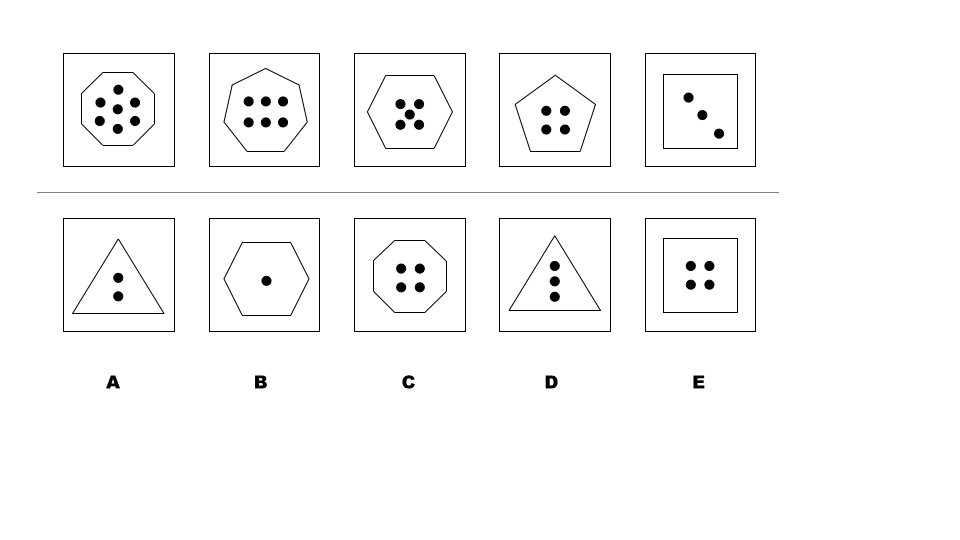Which Option Is An E Ample Of Inductive Reasoning
Which Option Is An E Ample Of Inductive Reasoning - A classical example of an incorrect inductive argument was presented by john vickers: This type of thinking is very useful in writing. Web revised on 5 december 2022. Web inductive reasoning allows for the possibility that the conclusion is false, even if all of the premises are true. However, there is a significant difference between a strong and a weak inductive argument. Inductive reasoning is a method of drawing conclusions by going from the specific to the general. Web the study of inductive logic is more complex than deductive logic, and it is not as well developed. Inductive reasoning is a logical process in which multiple premises, all believed true or found true most of the time, are combined to obtain a specific conclusion or to supply evidence for the truth of a conclusion. Therefore, he will be late tomorrow , letter c, as explained below. Web inductive reasoning is based on your ability to recognize meaningful patterns and connections.
Therefore, he will be late tomorrow , letter c, as explained below. Web there is one logic exercise we do nearly every day, though we’re scarcely aware of it. Web inductive reasoning is the process through which we take small items we've seen or read and infer general ideas from them. So how do we know? Download reference work entry pdf. Revised on 10 october 2022. In a sense, inductive reasoning is your educated guess about any given situation or issue, using what you’ve experienced or learned from others.
It consists merely of several independent topical areas that focus on a particular kind of inductive argument. It’s usually contrasted with deductive reasoning, where you go from general information to specific conclusions. Web the study of inductive logic is more complex than deductive logic, and it is not as well developed. However, there is a significant difference between a strong and a weak inductive argument. Inductive reasoning is a method of drawing conclusions by going from the specific to the general.
Web inductive reasoning is projecting from what we know to make inferences about what we do not know. Therefore, he will be late tomorrow , letter c, as explained below. By taking into account both examples and your understanding of how the world works, induction allows you to conclude that something is likely to be true. Deductive reasoning deals with certainty and involves reasoning toward certain conclusions, inductive reasoning deals with probability and involves reasoning toward likely conclusions based on data, and abductive reasoning deals with guesswork, involves reasoning toward possible. Induction is about reasoning from examples. Web revised on 5 december 2022.
Obviously, no one has seen all of the sunrises that ever happened. However, there is a significant difference between a strong and a weak inductive argument. We take tiny things we’ve seen or read and draw general principles from them—an act known as inductive reasoning. Web revised on 5 december 2022. Web inductive reasoning allows for the possibility that the conclusion is false, even if all of the premises are true.
Deductive reasoning deals with certainty and involves reasoning toward certain conclusions, inductive reasoning deals with probability and involves reasoning toward likely conclusions based on data, and abductive reasoning deals with guesswork, involves reasoning toward possible. Web inductive reasoning is projecting from what we know to make inferences about what we do not know. However, there is a significant difference between a strong and a weak inductive argument. It's a process where you notice a pattern from specific cases, form a hypothesis about a general rule, and then test and verify this hypothesis with additional examples.
It Involves Making A Prediction About What May Happen Based On What You Know.
Web inductive reasoning is a mental process for making decisions. The general unproven conclusion we reach using inductive reasoning is called a conjecture or hypothesis. Deductive reasoning deals with certainty and involves reasoning toward certain conclusions, inductive reasoning deals with probability and involves reasoning toward likely conclusions based on data, and abductive reasoning deals with guesswork, involves reasoning toward possible. In a sense, inductive reasoning is your educated guess about any given situation or issue, using what you’ve experienced or learned from others.
Web Inductive Reasoning Is A Reasoning Method That Recognizes Patterns And Evidence From Specific Occurrences To Reach A General Conclusion.
Induction is about reasoning from examples. As we shall see, inductive reasoning is about seeing patterns and making claims that extend beyond the data at hand. Web there is one logic exercise we do nearly every day, though we’re scarcely aware of it. Web sal analyzes a solution of a mathematical problem to determine whether it uses inductive reasoning.
This Type Of Thinking Is Very Useful In Writing.
Inductive reasoning is a method of drawing conclusions by going from the specific to the general. But there’s a big gap between a strong inductive argument and a. The main difference between inductive and deductive reasoning is that inductive reasoning aims at developing a theory while deductive reasoning aims at testing an existing theory. Inductive reasoning is a logical process in which multiple premises, all believed true or found true most of the time, are combined to obtain a specific conclusion or to supply evidence for the truth of a conclusion.
However, There Is A Significant Difference Between A Strong And A Weak Inductive Argument.
A classical example of an incorrect inductive argument was presented by john vickers: Some inductive arguments are of more than one kind. Web revised on june 22, 2023. It consists merely of several independent topical areas that focus on a particular kind of inductive argument.






